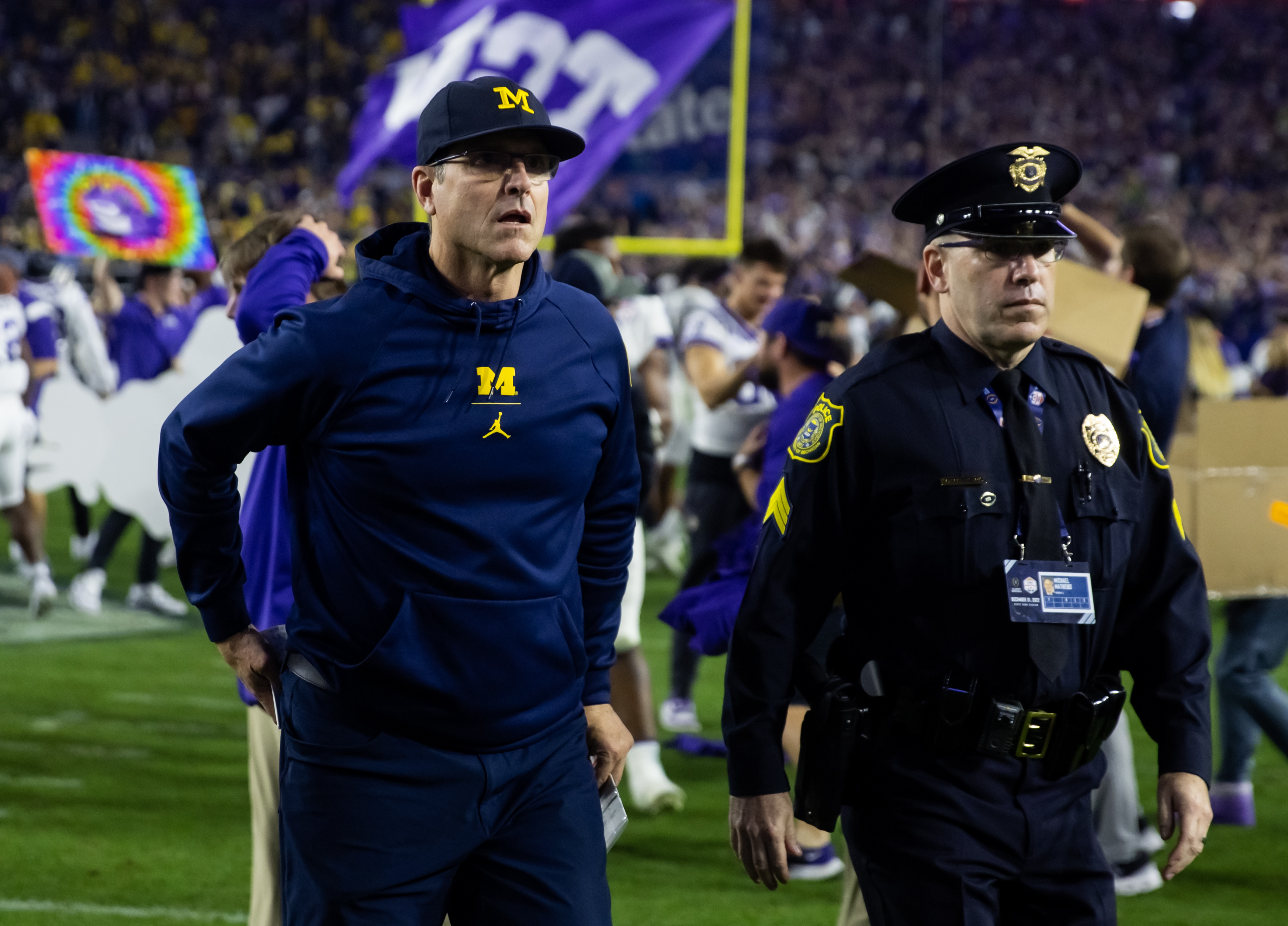Ad Disclosure

Hickey: Jim Harbaugh showing, again, that the cover-up is worse than the crime
By Alex Hickey
Published:
Richard Nixon is not a role model.
But there’s a lesson to be learned from Tricky Dick, and you’d think an ardent student of history like Jim Harbaugh would notice. But maybe Harbaugh, who once compared Michigan’s ground game to George S. Patton’s, is more into generals than presidents.
The cover-up is almost always worse for the sketchy party involved than the crime that preceded it.
Nixon’s original crime — authorizing the burglary of the Democratic National Committee’s headquarters at the Watergate Hotel in 1972 — was made far worse by the multitude of laws his administration broke in the attempt to sweep the issue under the rug. It cost him his presidency — an event still without precedent in American history.
But the lessons of Nixon don’t just apply to politics. Time and time again, they have been ignored by college coaches who find themselves in much deeper water than their initial misdemeanors warranted.
Look at Bruce Pearl.
Pearl committed a totally innocuous violation while coaching at Tennessee, inviting recruit Aaron Craft’s family to a cookout at his home. Since Craft was making an unofficial visit, that was not allowed under NCAA rules.
Pearl lied about it to investigators, and told Craft’s dad to do the same. What should have been a wrist-slap led to an 8-game suspension because Pearl lied. And when other allegations were uncovered, Pearl lost his job and was hit with a 3-year show cause penalty.
Ironically, Pearl’s last game at Tennessee was a loss to Michigan.
And he’s not even the only coach who saw his career go down in flames shortly after a game against the Wolverines.
Jim Tressel’s Ohio State tenure didn’t end because his players were trading memorabilia for tattoos. It ended because he lied about knowing about those NCAA violations. Tressel resigned.
The penalty for the original crime would have resulted in a 5-game suspension. Lying cost Tressel his job in May 2011.
Harbaugh is alleged to be the latest coach to fall prey to this folly. Given that the most infamous example of this malfeasance involves Ohio State, it’s an unacceptable mistake.
Turning molehills into a mountain
Michigan should be experiencing a light NCAA slap on the wrist at the moment. Thanks to Harbaugh’s alleged conduct, the Wolverines are instead dealing with an unnecessary crisis.
The NCAA Notice of Allegations sent to Michigan primarily charges Harbaugh and the Wolverines with the equivalent of an unpaid parking ticket.
Harbaugh committed a pair of Level II violations by contacting recruits during the COVID-19 dead period. Michigan also self-reported a violation involving an off-field analyst providing on-field instruction during a practice, which is not allowed.
The problem?
Harbaugh is accused of providing false or misleading information to the NCAA regarding his contact with recruits during the COVID dead period. So, what would have been a minor kerfuffle now becomes an alleged Level I violation.
Had Harbaugh been forthright, Michigan might be concerning itself with some set of penalties falling well short of scholarship reductions or worse.
But because the NCAA says he lied, there is the possibility of Harbaugh being suspended for a number of games. Or maybe the Wolverines will get penalized in recruiting.
All of these outcomes were avoidable — but none more so than the actions he took after the initial wrongdoing. What Harbaugh likely perceived as being best for the program was nothing more than selfish obstructionism.
And now the question becomes just how big a price Michigan will pay — because this isn’t only about a potential suspension.
A wrench in Harbaugh’s already murky future
A day before Michigan received the NCAA’s allegations, Harbaugh released a statement addressing rumors that he’s headed back to the NFL.
The most notable sentence: “I expect that I will be back enthusiastically coaching Michigan in 2023.” That’s a far cry from Michael Jordan’s “I’m Back” fax, to be certain.
A Michigan Man through and through.#GoBlue pic.twitter.com/ZLZiCSw8AG
— Michigan Football (@UMichFootball) January 5, 2023
Contrast Harbaugh’s tone with a much more definitive statement from Juwan Howard when he was rumored as a candidate for NBA openings.
— Juwan Howard (@JuwanHoward) August 24, 2020
If Harbaugh wasn’t already motivated to leave for the NFL, we now know he has extra impetus. It’s a chance to get out of town ahead of the posse looking to bring him down.
Of course, that becomes a question he now must answer in any prospective interview for an NFL gig.
“Are you here just because you don’t want to deal with NCAA penalties?”
Maybe Harbaugh will stick around in Ann Arbor and face the music. After all, he did give his word that he’ll be back at Michigan in 2023. Or that he expects to be, anyhow.
But Harbaugh also gave the NCAA his word before that. And we can see how that’s working out.
Alex Hickey is an award-winning writer who has watched Big Ten sports since it was a numerically accurate description of league membership. Alex has covered college football and basketball since 2008, with stops on the McNeese State, LSU and West Virginia beats before being hired as Saturday Tradition's Big Ten columnist in 2021. He is an Illinois native and 2004 Indiana University graduate.